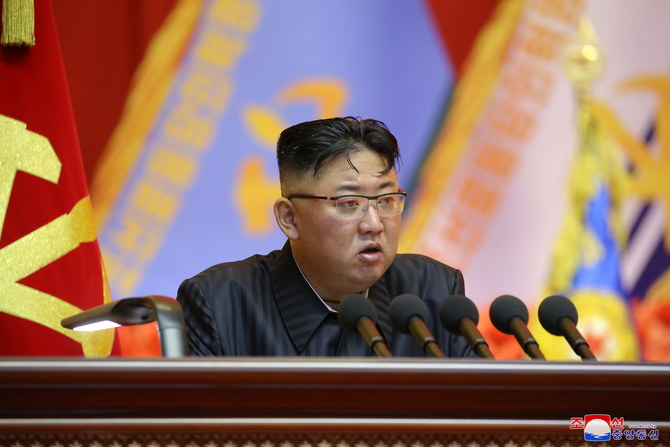
- ARAB NEWS
- 15 Jul 2025

There is no shortage of geopolitical challenges facing the world. COVID-19 infections are at record levels, the situation in Ukraine remains tense and unresolved, Iran continues to export terrorism across the Middle East, most of Afghanistan’s population is starving, China continues to threaten Taiwan. and Kazakhstan has entered a new era of instability and turmoil.
To add to the challenges, North Korea has conducted a hypersonic missile test in violation of UN Security Council resolutions.
Hypersonic missiles travel at five times the speed of sound. The technology is difficult to master, but when they work properly their high speed and maneuverability can evade missile defense systems. While it is not clear when North Korea will be able to mass produce hypersonic weapons, this is clearly a capability the regime desires. The missile used in the most recent test may be similar to, or a variant of, the Hwasong-8 hypersonic glide missile that was tested last September. Missile experts are still poring over intelligence reports, but this launch could be the first new system of 2022.
North Korea has been relentless in pursuing nuclear weapons and advanced missile programs for decades. This recent behavior is par for the course for North Korean strongman Kim Jong Un. During his decade in power, he has significantly expanded missile programs. In particular, beginning in 2016-2017, he has presided over an exponentially increased missile testing program.
In 2019 North Korea conducted 26 short and medium range missile tests. This was a record-setting year for Pyongyang in terms of missile testing. In March 2020, it conducted nine short and medium range missile tests, the most it has conducted in a single month. At the time, hoping to reach a diplomatic settlement, Donald Trump downplayed the tests and claimed they were not in violation of UN resolutions — even though they were.
In response to the most recent test, the Biden administration is taking a more traditional American approach. The State Department issued a routine condemnation without threatening any consequences for Pyongyang. While such statements do not worry the North Koreans, policymakers there will notice the change from the Trump administration. In Trump’s desperation to foster relations with Kim, few statements were ever issued by the State Department condemning North Korea’s missile tests.
North Korea’s missile program is destabilizing outside northeast Asia too. Policymakers in the Middle East should be watching Pyongyang’s developments closely. There has been a track record of close cooperation between Iran and North Korea. This is especially true on nuclear weapons research, ballistic missile development, and maritime capabilities.
Every successful North Korean missile or weapons test on the Korean peninsula could impact regional security on the Arabian peninsula thousands of kilometers away.
Luke Coffey
The ballistic missile relationship dates back to the 1990s, and continues today. For example, North Korea’s No Dong 1 medium range ballistic missile forms the basis of the Iranian Shahab 3. One area that Iran would like to improve on is its intercontinental ballistic missile capability — an area where Pyongyang is well placed to help. Cooperation extends beyond missile development; Iran operates a number of Ghadir mini-submarines based on the North Korean Yono-class design.
Iran’s relationship with North Korea on nuclear weapons is secretive. Little information is publicly available. In 2007, Israel destroyed a nuclear reactor in Syria that was built by the North Koreans and suspected to be the basis for a Syrian nuclear weapons program. One can therefore reasonably assume that North Korea and Iran share the same cozy relationship regarding nuclear weapons.
As North Korea continues to reject dialogue, the US and its allies and partners in Asia need to maintain credible deterrence and defensive capabilities. This must include missile defense for the American homeland and allies overseas.
A strong and robust missile defense system is an important component of America’s national security architecture; it gives policymakers more time to make decisions during a crisis, and offers the US a greater ability to deter attacks. If an attack does occur, a missile defense system can protect vital infrastructure and population centers.
In addition to northeast Asia, the US should also place a particular focus on helping its partners in the Middle East improve their missile defense capabilities, especially since there is a close level of cooperation between North Korea and Iran. Doing so is in America’s national interest. After all, there are thousands of US service personnel and more than 100,000 American citizens in the Middle East, all of them are under threat from Iranian missiles.
One could easily make the argument that the timing of North Korea’s test is no coincidence. Biden looks weak in the aftermath of Afghanistan and America is distracted by mounting domestic problems. While this may be true, policymakers should also view North Korea’s actions as a continuation of a long-term armament process with a goal of undermining regional security in northeast Asia.
But this is a Middle Eastern problem too. Every successful North Korean missile or weapons test on the Korean peninsula could impact regional security on the Arabian peninsula thousands of kilometers away. So 2022 is going to be a long year.